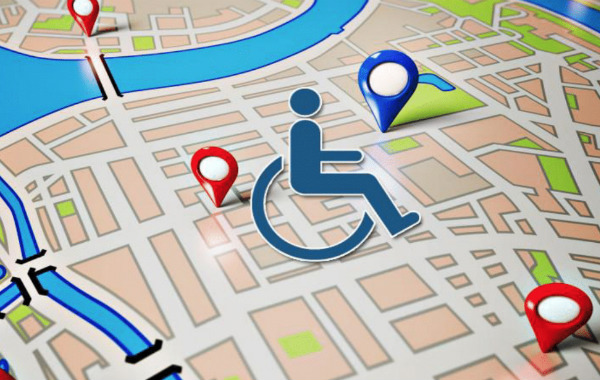
March 16 is 'Disabled Access Day' so we asked our friend Eric Griffiths, who is the deafblind Chair of Salford Disability Forum, to share some of the access challenges he faces regularly and to suggest ways that things might improve.
Disabled access is so important because disabled people need to access buildings and services as readily as able-bodied people.
As a deaf-blind person, what are some of the barriers you face in your everyday life?
- Doctors’ surgery door access – if there’s a bell, I can’t hear it. I often wait a long time to get in.
- To make a complaint to TfGM (Transport for Greater Manchester) I need to quote the bus’s running number and identify whether the driver is male or female. How can I do this when I’m blind / visually impaired?
- There is generally a lack of dropped curbs, or vehicles are parked on them.
- Blocked bus stops prevent me from accessing buses.

Access often concentrates on wheelchair users but other forms of access are just as vital.
Tell us about some of your experiences as a deafblind person.
- Where I live, I can’t safely cross the road by myself. On pelican crossings, I can’t hear the beeping or see the green man. I rely on a tactile cone underneath the box; these are often broken off, not working or missing completely. The council does not take my complaints seriously and will not pay to upgrade the lights.
- Some crossings are being converted to “smart” crossings which will not be accessible to me at all or to anyone with a guide dog.
- The proposed diagonal crossings will not be accessible to many people including me. This will include those with guide dogs, people with prams and people in wheelchairs.
Do you have any tips for organisations interested in improving access?
- They must consult with the public, especially the disabled public, as to how the access to all buildings is designed.
- The location of bus stops needs careful consideration. There needs to be room for wheelchairs and prams otherwise bus drivers go beyond the stop to pick people up.
- Street furniture needs to be placed away from the centre of the pavements. Lights should be placed at the edge of pavements and A boards should not be allowed on pavements.
- Councils often build properties which are not accessible for an SN1 (Special Needs Level 1 is a building category); they are built without wheelchair-accessible kitchens. They require adaptation after the developments have been finished and this is completely unacceptable and not cost effective.
- TfGM need to ensure that all audio/visual equipment on buses is working. In London for instance, buses without the correctly working equipment are taken out of service until the problems are fixed. Also in London, equipment and buses are tested to high standards to ensure they are fully conversant with regulations before they go into service.
Read more about Eric and watch our short film here.

We are what we do and we love what we do.